All For The Love Of Lake Horowhenua -The Phil Taueki Story
All For The Love Of Lake Horowhenua
The Beginning Of The End Of The Epic Saga of Phil Taueki's Fight For Lake Horowhenua
By Anne Hunt
Lake Horowhenua activist Philip Dean Taueki is back in court, this time because he is determined to stop the Horowhenua District Council endangering the lives of children playing on their own land.
Lawyers funded by the district’s ratepayers are questioning Taueki’s standing to bring a case to prevent council discharging Levin’s stormwater into the privately-owned Lake Horowhenua.
Dr Max Gibbs from NIWA warned several years ago that Lake Horowhenua is so toxic that a mouthful of water can be lethal enough to kill a child.
Levin’s stormwater is a major source of phosphorous, and phosphorous is the major cause of cyanobacteria that has plagued the lake in recent years.
In his 2012 report, Dr Gibbs refers to a report that 80% of the lake’s phosphorous comes from the town’s stormwater system.
As an owner of the lake, Taueki had filed an application with the Maori Land Court to get the stormwater out of the lake several years ago.
During a two-day hearing in March 2012, council’s lawyers promised to provide within 28 days an authority that would allow them to pipe stormwater across Maori Freehold land and into the lake.
Instead, the Horowhenua District Council engaged Wellington legal firm Buddle Findlay who have resorted to a variety of diversionary tactics, including strike out motions and appeals to the Appellate Court.
In their determination to undermine Taueki’s standing as an owner, the firm’s lawyers have even managed to convince Judge Doogan that he has the jurisdiction to consider overturning a judgement released by the more experienced Judge Harvey during May this year.
This hearing is scheduled to take place in Levin on 17 September, and Taueki has been advised to bring along a lawyer due to the technical issues involved.
He scoffs at that. “There is only issue involved, and that is the safety of our children.”
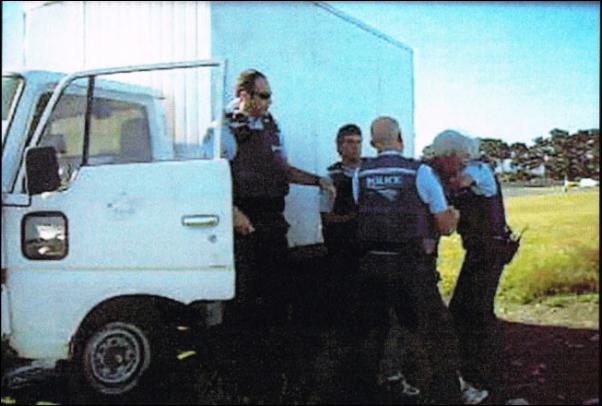
Taueki, under arrest, after protesting about the state of the lake.
Taueki is no stranger to the courtroom.
Since he was first arrested in September 2008 following a confrontation with sailors using his lake, he has remained on bail while defending a multitude of charges which he says are nothing but an excuse to keep him away from his lake.
In that time, he has lost count of the number of times he has been arrested, the hours wasted in police calls and the assaults, even while in prison on remand.
But he has kept a tally of the thirty consecutive charges that he has defended over the past few years that have been withdrawn, dismissed or quashed on appeal. Two convictions with discharge, he appealed before leaving the courthouse because he is adamant that he is innocent of those as well.
However it is the state of the lake that bothers Taueki most.
There is no dispute whatsoever that Lake Horowhenua is privately-owned.
A certificate of title was issued in the name of Mua-Upoko owners in 1899.
Nobody can reach Lake Horowhenua without crossing this Maori Freehold Land.
But in 1905, Parliament passed a law letting the public use this lake ‘free of charge’.
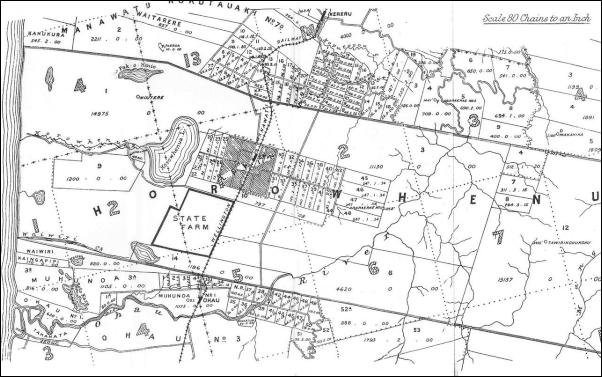
Click for big version
An 1887 Map of the Lake and Levin
Control of the lake was placed in the hands of a Domain Board, with no provision for any representation from the owners.
Within a year, questions were being asked in Parliament about the repeal of legislation that ‘appropriates a valuable estate without the consent of the owners’,
Even though there have been commissions of inquiry, delegations to the Ministers and numerous court cases over the past century of so, nothing has changed.
It is, says Taueki, theft by statute.
On the very day of his sentencing on his final criminal charge, out of the blue Taueki received a letter from the Minister for Maori Development conceding that such a law would not be put in place today.
The Hon Te Ururoa Flavell says he can understand how these arrangements had generated conflicts, going right back to the early 1900’s and earlier.
But this letter is cold comfort for the owners whose pristine lake has deteriorated to the extent it is now rated one of the most polluted lakes in the country.
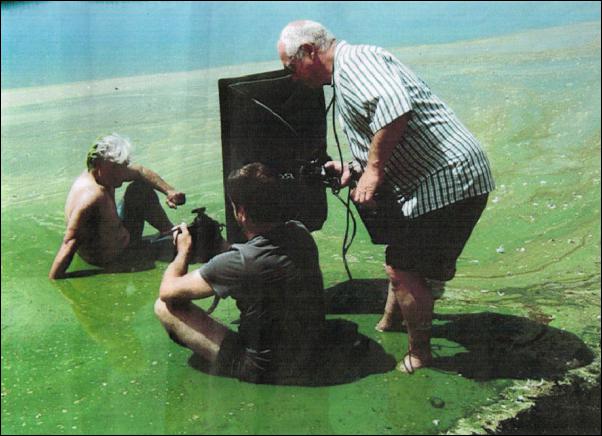
David White photographing Taueki in Lake Horowhenua, with the assistance of supporter Bryan Ten Have.
It is now three and a half years since Dr Max Gibbs from NIWA warned that the waters of the lake had become so toxic that a mouthful of water was lethal enough to kill a small child.
The response from the five statutory bodies with a responsibility for the state of the lake was to set up a Lake Accord.
Part of the Accord’s management plan is to eliminate or reduce the nuisance cyanobacteria.
The Local Government Act does not allow a local authority to create a nuisance on private property, even when constructing works for land drainage.
But the Horowhenua District Council has failed to come up with a resource consent, an easement or any form of authority that would allow it to pipe contaminants across Maori land into the waters of the lake.
Taueki is not impressed with the Lake Accord, stating that it is nothing but an excuse to extract funding from the Government and set up a few cosmetic projects that will impress the gullible.
The Accord has already been granted $1.27 million from the Government for a Clean Up Fund.
Research commissioned by the Waitangi Tribunal tends to support Taueki’s contention that this Accord is yet another in a long line of empty gestures.
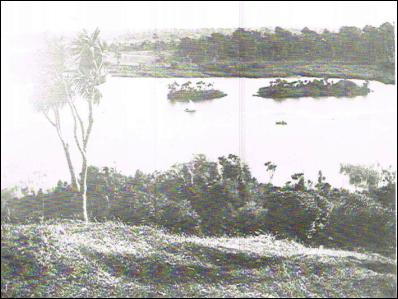
An historic picture of Lake Horowhenua before it became polluted
As for the Maori Land Court, he is not impressed by the fact that they fail to grasp the principles of kawanatanga expressed in the preamble to their Act.
The irony is that the standing of this court relies solely on the Treaty that Taueki signed as the Rangatira of Mua-Upoko on 26 May 1840.
Taueki is, as the name implies, a great great grandson of Taueki.
As such, he is entitled to ‘undisturbed possession’ of land collectively owned.
Undisturbed possession, he reckons is the right of Mua-Upoko children to wade in the shallows of a lake on their own land without suffering the effects of council’s contamination.
This October marks 110 years since Parliament passed the law that took away the right of owners to control what happens on their own land and gave that authority to other parties.
Taueki is disgusted with the hypocrisy of another Accord partner, Horizons.
Bio-security consultant Bill Chisholm provided Taueki with a report that the mere presence of a sign near the boat club warning that boaties and other recreational users of the lake about the dangers of lake weed spread, is insufficient to manage the present threat of aquatic weed invasion.
While a complete ban on boating may seem draconian, he said that “boaties should be reminded that if these aquatic weeds enter the lake, then there will probably be no boating at all in the future because the weed mats will make boating physically impossible”.
Aware that motor boats were not allowed on the lake, Chisholm said this is probably the main reason why three particularly invasive weeds were not yet present as they can easily hitch a ride on motor boat trailers and outboard propellers.
However, he added that the threat from non-motorised boats and their trailers remains.
Taueki took the responsible course of action by applying to the Maori Land Court for an injunction to prevent boats being launched on the lake until the Domain Board installed a wash-down facility.
Judge Doogan rejected Taueki’s application.
A month later, Horizons and NIWA turned up at the lake ready to launch their motorised boats on the lake. Taueki quickly parked his truck on his own land in an attempt to stop them. The police were summoned and arrived, as usual, in force. Taueki was ordered to remove his truck. He refused.
Several police officers then grabbed him in a choke hold and wrestled him out of his truck, even though a supporter was videotaping this incident. Charges of obstruction and resistance were quietly dropped after Police Area Commander Pat Handcock referred this matter to the IPCA.
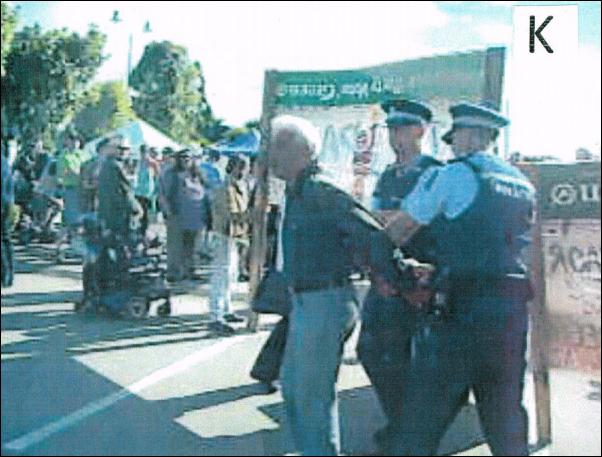
Taueki is taken into custody after trying to prevent Horizons and NIWA launching unwashed boats into the lake.
Nevertheless, Taueki had been arrested, handcuffed and marched down to the police station to be held in custody while Horizons and NIWA placed his lake at risk of irreversible damage from an invasive weed.
If Taueki is prepared to put his life and his liberty on the line for his lake, this passion arises from his heritage.
His duty as kaitiaki cannot be abrogated, he says simply.
Mua-Upoko was once renowned for its fighting prowess, stamina, ingenuity and hospitality due to the native delicacies that once thrived in the lake.
Seven artificial islands created on their lake provided a sanctuary for their women and children, while their warriors slept close to an arsenal of weapons.
The mutilation of a high-born Mua-Upoko woman walking alone, provoked a retaliatory raid on Te Rauparaha and his family, leaving his favoured son and daughter dead. Escaping naked into the darkness, Te Rauparaha vowed to exterminate Mua-Upoko.
This time, Mua-Upoko’s foe was armed with English muskets.
When Ngati Toa attacked Mua-Upoko’s island refuges, so great was the slaughter of men, women and children that the waters ran red with blood.
Many Mua-Upoko fled.
Those captured were herded like sheep as fresh meat to feed their enemy, or stockaded on an island to be consumed one by one, after a tortured slaying.
Concealed in the Kawiu clearing nearby, Taueki would have heard their plaintive cries drifting across the silence of the lake, unable to rescue them if their tribe was to survive.
Nevertheless Taueki’s allies were gaining momentum, and even a contemporary biographer accepts that Te Rauparaha was eventually forced to retreat to his own island of refuge, Kapiti.
However the weapons of law proved to be more potent than the weapons of law.
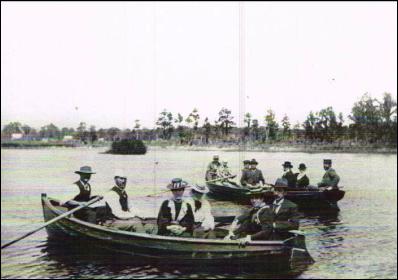
The gentlefolk of Levin boating on Lake Horowhenua in 1908 shortly after the 1905 appropriation of use of the lake by statute.
It was Prime Minister Seddon who spearheaded the legislation that effectively deprived the owners of all rights of ownership.
This colonial arrogance became so entrenched in the Levin community that there was nothing the owners could do to stop members of the sailing and rowing clubs erecting clubrooms on land that they did not own, and without permission from the owners.
The leases negotiated with the Lake Domain Board expired in 2003 and 2007 retrospectively.
The Reserves Act introduced in 1977 prevented the Domain Board from renewing these leases and therefore in 2006, the Domain Board circumvented the law by resolving to roll them over on a month by month basis.
Taueki questioned the legitimacy of this situation at the time, but was ignored.
One sunny Sunday morning in 2008, he spotted a group of sailors transporting in yachts and preparing to launch a motorised boat for a regatta organised without the permit required by the Domain by-laws.
In court, the sailors had no hesitation admitting they were not going to let Taueki ‘spouting’ on about by-laws spoil their plans for the day, even if it was a condition of access, under the Reserves Act.
Instead, they summoned the police and as soon as the police arrived, Taueki was in handcuffs and his way to the police station where he would be held in the police cells while the sailing club continued with their regatta uninterrupted.
One of the complainants, David Brown denied he swore at Taueki.
Obviously he did not realise that all emergency calls were recorded, because when his call was replayed in court, he could be clearly heard calling Taueki a ‘black bastard’ and ‘fucking wanker’ before trespassing Taueki from his own land.
The transcripts and court
judgements that Taueki has assembled over the years present
a compelling account of a community that treats the lake as
their own asset, and Taueki as a mad Maori who is the cause
of all the problems down at the lake.
There is for instance the case where Justice Kos refers to another regatta that had not been organised lawfully. “There was no permit for the assembly or event. And there was no permit for the motorised craft on the lake. Each permit should have been obtained.
“To make matters worse, the organiser of the event was a constable.”
To make matters even worse, that day Taueki had just collected relatives arriving from overseas for his Mum’s tangi the next day. From inside his home he could hear people laughing while setting up stalls only metres away.
He approached the organiser who told Taueki in no uncertain terms this was not his land before summoning his colleagues to come down and lock Taueki up.
Taueki then spent several hours fretting in the police cells that he would miss his Mum’s tangi.
There were other cases dropped at the last minute because the evidence that Taueki intended to produce would prove too embarrassing for the police.
A classic was the time a rowing club member and accomplice drove over to his sister’s place where Taueki had been bailed due to early morning death threats at his previous bail address. His sister and her husband ordered these intruders off their property. The intruders refused to leave and continued to make threatening gestures. When Taueki was punched in the face, she phoned the police. She was also attacked in front of her young children getting ready to leave for school.
The police did not arrive at the scene until later that afternoon, and then only to investigate a complaint that the intruder’s van had been damaged before leaving the property.
Charged with wilful damage, Taueki served a summons on the intruder’s wife who had phoned the police that morning worried her husband would seriously harm Taueki. A senior Government manager, she informed Wellington Communications that if that happened, the police would think ‘yay’, before laughing.
Despite a survey peg marking the Domain boundaries, these rowers preferred to launch their boats north of the Domain boundary on land where they had no right of access. As this site is waahi tapu, Taueki would tell them in no uncertain terms to get off his land.
Following mediation arranged by the Human Rights Commission, Police Inspector Mark Harrison set in place protocols for the local police to follow whenever the rowers trespassed on his land. He was to phone the police and take photographs.
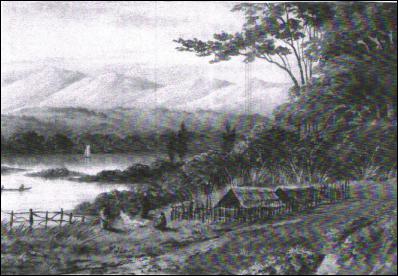
A picture of the unspoilt lake, prior to Pakeha settlement in the Levin area
On 11 February 2013, Taueki followed these procedures, but the police notes confirm that the police officers on duty that evening delayed departure while they checked out Taueki’s bail conditions, presumably looking for an excuse to hold him in custody that night.
As soon as the police arrived, Taueki was handcuffed and bundled into the back of a police car to be taken back to the police station.
Taueki was held in custody overnight until his appearance in court the following afternoon. He arrived home to find his Mercedes car parked outside his bedroom window trashed beyond repair, and his camera containing evidential photographs stolen.
Every window was shattered and every panel stoved in; so Taueki says it is obvious that only people who could have done that were those who knew he was being detained in custody that night.

The state of Taueki’s car, after a night spent in custody.
On 20 July that same year, a group of twenty rowers blatantly crossed the Domain boundary despite being cautioned by Judge Atkins not to do so.
When his supporters arrived on the scene, a police officer was reading Taueki his rights ready to arrest him, even though he was in a state of shock, with blood streaming down his hair from a blow to the back of his head and a face lacerated after being pummelled into the rocks.
Taueki laid a formal complaint, and when he asked a police sergeant whether it would be investigated, he was told: Probably not.
Six months later, the police sent Taueki a letter confirming that they were not going to prosecute the rowers even though they admitted tackling him to the ground and holding him there for some time. As the senior police officer reported, Taueki ‘remonstrated’ with the rowers, they believed an assault was imminent and whether they were trespassing was ‘immaterial’.
But Taueki says that it is not just a case of trespassing.
The rowers use the bushes in this area to urinate, as rower and councillor Jo Mason testified nonchalantly in court.
From the window of his home, Taueki often observes people squatting there, depositing faeces and toilet paper.
Inside a building used by rowers is a sign pointing in this direction for toilets.
These Domain buildings are another contentious issue for Taueki.
As fixtures, they now belong to owners of the land upon which they were built.
The Supreme Court established in 2013 that the sailing and rowing clubs did not have any legal right to occupy these buildings at Lake Horowhenua.
In the Maori Land Court, Judge Harvey had already told the Chairman of the Lake Domain Board that ‘it would not be unreasonable to expect that formal notice of the requirement to vacate the buildings would be issued’.
The rowers refused to budge.
During the summer of 2014, rumours reached a group of owners that the cyanobacteria had got so bad that year that the rowers have transferred training to the Manawatu River, and were storing their boats elsewhere.
By the end of March, these owners decided to the time had come to use their own buildings to store their own boats and equipment.
They entered the building, shifted a few items of no value to one side, swept it out and moved their gear in.
A day or so later, the police left the owners at bay while the rowers turfed out the boats belonging to the owners and changed the locks.
The police then put in place a 24 hour scene guard to stop the owners from returning to their own building.
A Police Inspector was dispatched from Police National Headquarters to meet with Taueki and his supporters in an attempt to defuse the situation. As soon as he arrived, he stood down the scene guard. Following a lengthy meeting in which Taueki produced copies of the various court judgements supporting his position, Taueki was given an assurance that this police officer would get back to him the next day.
That deadline was extended, and then Taueki decided he was not prepared to wait any longer.
He re-entered the building, and was removing some junk when the police turned up. Taueki explained what he was doing, and told them that they could not arrest him for being unlawfully in the building, because the previous time the police had tried to do that, the charge was dropped well before it came before the court.
In court, the police testified that they gave Taueki permission to drive his truck away.
He went inside to make a number of phone calls, and then eventually decided that he was no longer going to wait around for the police to come up with some other b*** charge as an excuse to arrest him.
The next morning, visitors found cops swarming all over the place.
Several weeks later Taueki was arrested when he turned up for court on another matter, and remanded in custody on a total of eleven charges, including escaping from custody.
Four were withdrawn six months later.
Six were dismissed following nine days of trial during February this year.
In court, the police still insisted that the rowing club leased the building, even though not a single prosecution witness could provide any evidence of a lease.
Dismissing a couple of male assaults female charges, Judge Hastings came to the conclusion that the complainant was the aggressor. “The force used was in self-defence and was reasonable in those circumstances in that it was proportionate and no more than necessary to remove the scooter from Mrs Williams”.
Taueki says that it is absurd that the only charge the police got him on is escaping from custody, and so convinced is he of his innocence on that one, he had lodged an appeal before he had even left the courthouse.
He questions whether any reasonable person consider himself to be in custody when given permission to leave. With any doubt or confusion, he says the case law favours the defendant.
Taueki often wonders whether he had been set up that night.
When hearing the charges laid on 11 February 2013, a crucial issue for Judge Hastings had been whether the rowers launched their boats within the Domain south of the boundary peg, or north of it.
At the time this case was heard, Taueki was on EM Bail conditions so strict that he was unable to leave his bail address for any reason except to attend court. As a self-litigant he was denied the right to meet with prosecution witnesses unless they came to his bail address at a supporter’s place or track down crucial documents that had gone missing from his home in his absence.
For the three-day trial in the heart of winter, EM Bail expected him to eat his lunch outside on a bench that straddled the court building and the footpath, with no shelter from the rain or wind.
During the trial, James Watson as the complainant, testified that the rowers decided to launch from the south to ‘try and appease your small-mindedness’.
When asked if they launched their boats north of the boundary now that Taueki was not at the lake, he replied: Yes.
In other words, Taueki’s two months in custody on remand and then release wearing an electronic bracelet prohibiting him from going anywhere near his lake meant that the rowers could once again do what they liked down at the lake because there was nobody around to stop them.
If anything exemplifies the Treaty violations when it comes to the lake, Taueki considers that his Supreme Court judgement would top the list.
As a self-litigant, he had managed to convince the Supreme Court to hear his appeal into a non-injury assault conviction following the incident that took place down at the lake on September 2008.
Judge Atkins had ruled that Taueki was not in peaceable possession of his own land, relying on a Canadian case known as ‘Born with a Tooth’.
The proposition Taueki put to the Supreme Court was compelling: define peaceable possession in a matter that recognises the unique circumstances in New Zealand due to the existence of the Treaty of Waitangi.
Such was the interest in this case in legal circles, that Dr Gerard McCoy QC offered to fly back from Hong Kong to represent Taueki in court pro bono.
In the Court of Appeal, Crown Law argued that title was nothing but a name on a piece of paper, and the owners had the same sorts of rights as the public.
Dr McCoy presented his arguments to the Supreme Court during a hearing in Wellington on 11 March 2013.
The outcome was a disappointment.
The Treaty rated not even a mention.
Delivered nine months later, a week before Christmas, this Supreme Court judgement suggests that even ownership of a property in fee simple estate is not sufficient to establish that a person is in peaceable possession of his own property.
Over the years, the Mua-Upoko owners have neither sold nor leased their privately-owned property to any other party, including the Crown.
And yet the Courts in this country, from the lowly Maori Land Court to the Supreme Court itself respect the right of the Maori owners to decide what happens on their own land.
Taueki says that these courts have undermined the whole concept of property ownership in this country.
“Title is, as Crown Law claims, nothing but a name on a worthless piece of paper.”
But he is adamant that he is not going to let this matter rest there.
He says there are court judgements going back a century or more establishing that the lake was to be administered along the principles that applied before the advent of the Pakeha and their artifices for creating laws and property rights.
He says that the decision by a mere Maori Land Court to call a special hearing to determine whether he has the standing to stop the local council polluting a privately-owned lake and endangering the lives of children is the final straw for many of the owners.
It is now only a matter of time before the owners seize back control of their own land and their lake, and he dares the police to arrest those who do so.
The time for waiting is over, he says. The time for action is here.
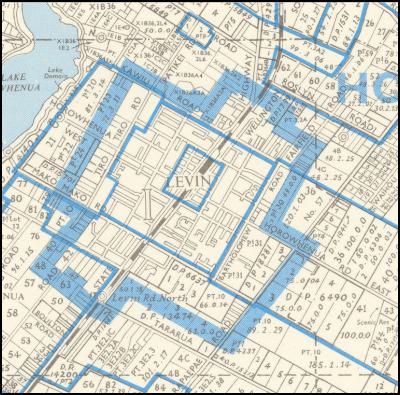
Anne Hunt is an author, who served three terms on the Horowhenua District Council. For the past five years, she has championed Taueki’s cause, regularly appearing as his McKenzie Friend in court and providing a bail address whenever necessary to prevent a remand in custody.


 Binoy Kampmark: Commemorating Mummy - Reflections On Mother’s Day
Binoy Kampmark: Commemorating Mummy - Reflections On Mother’s Day Gordon Campbell: On The New Pope, And The Israeli Attack On Peter Davis
Gordon Campbell: On The New Pope, And The Israeli Attack On Peter Davis Martin LeFevre - Meditations: For The Love Of Sycamores
Martin LeFevre - Meditations: For The Love Of Sycamores Ian Powell: A Timely Call For A Social Contract In Health
Ian Powell: A Timely Call For A Social Contract In Health Binoy Kampmark: Bratty Royal - Prince Harry And Bespoke Security Protection
Binoy Kampmark: Bratty Royal - Prince Harry And Bespoke Security Protection Keith Rankin: Make Deficits Great Again - Maintaining A Pragmatic Balance
Keith Rankin: Make Deficits Great Again - Maintaining A Pragmatic Balance